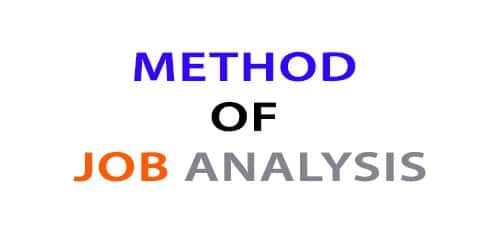Job analysis is a process to establish and document the “job relatedness” of employment procedures such as training, selection, compensation, and performance appraisal. It is a process to identify and determine in detail the particular job duties and requirements and the relative importance of these duties for a given job.
Method of job analysis: Several methods exist that may be used individually or in combination. These include:
Review – under this method, employee clarified jobs are reviewed. The purpose is to ensure that classification is done properly.
Expert panels – Experts on different jobs are a dependable source of information related to jobs. Under this method of job analysis, a panel of experts is preferred and interview whenever necessary.
Task inventories: The analyst may select some important and representative tasks for analysis. This can save money, times and effort.
Checklist: under this method of job analysis some characteristics or criteria are selected and a checklist is prepared. After that these characteristics may be distributed points depending on the degree of the selected employee.
Open-ended question: In this method, some questions are set and respondent employees are asked to respond. Multi-dimensional responses come in this method and these tabulation and analyses become difficult on the pan of an analyst.
Incumbent work logs: This is the last method of job analysis. Employees work logs are collected and necessary information are taken from the log analysis.
Individual interview methods: The individual interview method assembles a team of job incumbents for extensive individual interviews. The results of these interviews are combined into a single job analysis.
Group interview: The group interview method is similar to the individual interview method except that job incumbents are interviewed simultaneously.
Observation method: A Job analysis technique in which data is gathered by watching employees work directly or review of workers on the job.
Technical conference method: A job analyst’s technique that involves extensive input from the employee’s supervisor.















